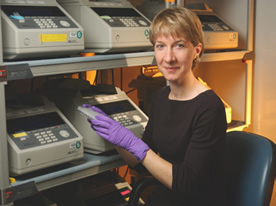 |
| Dr.
Daphne W. Bell |
Twelve NIH-associated scientists, including two intramural researchers at the National Human Genome Research Institute, have received the 2007 Presidential Early Career Award for Scientists and Engineers (PECASE). The awards were made at a White House ceremony on Dec. 19 and were among 60 presented to young scientists funded by federal agencies.
Honorees from NHGRI are Dr. Daphne W. Bell, investigator in the Cancer Genetics Branch, and Dr. Elliott Margulies of the Genome Technology Branch.
“The PECASE award is a major honor that identifies young researchers at the vanguard of science, and who are expected to be rising stars,” said Dr. Alan Guttmacher, acting director of NHGRI. “Every recipient can be duly proud of being selected; Dr. Bell and Dr. Margulies are to be commended for achieving this recognition in pursuit of research at NHGRI.”
PECASE has been conferred annually since 1996 and is the highest honor bestowed by the U.S. government on outstanding scientists and engineers early in their independent careers. Selection is based on the combination of innovative research at the frontiers of science and technology and community service demonstrated through scientific leadership and community outreach.
“With this award, Dr. Bell’s cancer research and Dr. Margulies’ bioinformatics expertise are being recognized by the highest office in the United States,” said Dr. Eric Green, NHGRI scientific director. “This is a real feather in their caps and an honor for the NHGRI Division of Intramural Research.”
Bell, who reacted with surprise to the news of her selection, is a cancer geneticist. “I was astounded,” she said. “This is a real honor.” Her research aims to identify the genetic changes that are involved in endometrial cancer, the most commonly diagnosed gynecological malignancy in the U.S., killing some 7,500 American women each year. Using sophisticated approaches, including DNA sequencing technology, she compares the sequence and number of genes in tumors and healthy tissue from endometrial cancer patients to hunt for mutations and other genetic changes that have led to tumor development.
“In endometrial cancer, we are searching for changes in genes that signal to a cell when it should divide and when it should die,” she explained. When these signals are disrupted, normal cells may start to divide uncontrollably, forming a tumor. “There are drugs in development that can shut off the faulty signal,” she added. “The key is to find the faulty genes.” An exciting prospect in her research is the chance that genes altered in endometrial cancer are potentially the same as those altered in other forms of cancer.
“What we appreciate now is that there won’t be one kind of genetic change that causes all endometrial cancers,” she said, offering that it is necessary to identify the gene signatures present in a specific patient’s tumor so that therapies can be tailored to each patient. “This illustrates the importance of understanding the genetic changes that cause cancer and using that information to think about ways to develop personalized treatment approaches.”
Bell, a native of County Armagh in Northern Ireland, completed her bachelor’s degree in genetics and zoology and her Ph.D. in biology and biochemistry at Queen’s University in Belfast. She conducted postdoctoral research at Fox Chase Cancer Center in Philadelphia and served as an assistant professor of medicine at Harvard Medical School and Massachusetts General Hospital in Boston. She joined NHGRI in 2006.
 |
Dr. Elliott Margulies |
Margulies is a tenure-track investigator at NHGRI, where he uses high-performance, computational analyses and laboratory-based, high-throughput genomic methods to decipher DNA sequence and genome function. “This award would not have been possible without the phenomenal mentorship and resources that have been available to me at NIH,” he said.
With an undergraduate degree in biotechno-logy from Rutgers University and a Ph.D. in human genetics from the University of Michigan, Margulies arrived at NHGRI in 2001 as a postdoctoral fellow. His research has focused on the development of bioinformatic approaches for identifying and characterizing regions of the human genome that are evolutionarily conserved across multiple species. Genomic regions conserved over evolutionary time tend to be important for the survival of the organism; studying them provides crucial insights into the workings of a genome.
Margulies develops bioinformatic tools for analyzing the wealth of data that is being generated by genomic research today. “Over the last few years, we have seen a tremendous rise in the amount of DNA being sequenced because of increased speed and decreased costs,” he explained. “As tremendous as that has been, it is just the beginning of where we’re going. We already see that the bottleneck is bioinformatics and analysis.”
Projecting the prospects for his field, Margulies has his eyes set on the expansive growth of data to be generated in the coming years when sequencing an individual’s genome will no longer be technologically or fiscally prohibitive. “The amount of sequence data to analyze will be large; we’re trying to prepare for that,” he said, noting that the NIH Intramural Sequencing Center operates around the clock and can fill a terabyte of disk space with new DNA sequence that is generated in just 3 days. “My hope is that genome sequencing and assembly becomes so common that we can use it to help patients.”
The NIH extramural grantees also celebrating receipt of 2007 PECASE awards include the following 10 investigators: Dr. Thomas Blanpied, NIMH, University of Maryland, Baltimore; Dr. Kevin Eggan, NICHD, Harvard University; Dr. Raymond Habas, NIGMS, University of Medicine and Dentistry of New Jersey; Dr. Amy Heimberger, NCI, University of Texas; Dr. James Iatridis, NIAMS, University of Vermont; Dr. Francis Lee, NINDS, Cornell University; Dr. Michael MacCross, NIDDK, University of Washington; Dr. Suchitra Nelson, NIDCR, Case Western Reserve University; Dr. Laura O’Dell, NIDA, University of Texas, El Paso; and Dr. Li Zhang, NIDCD, University of Southern California. 